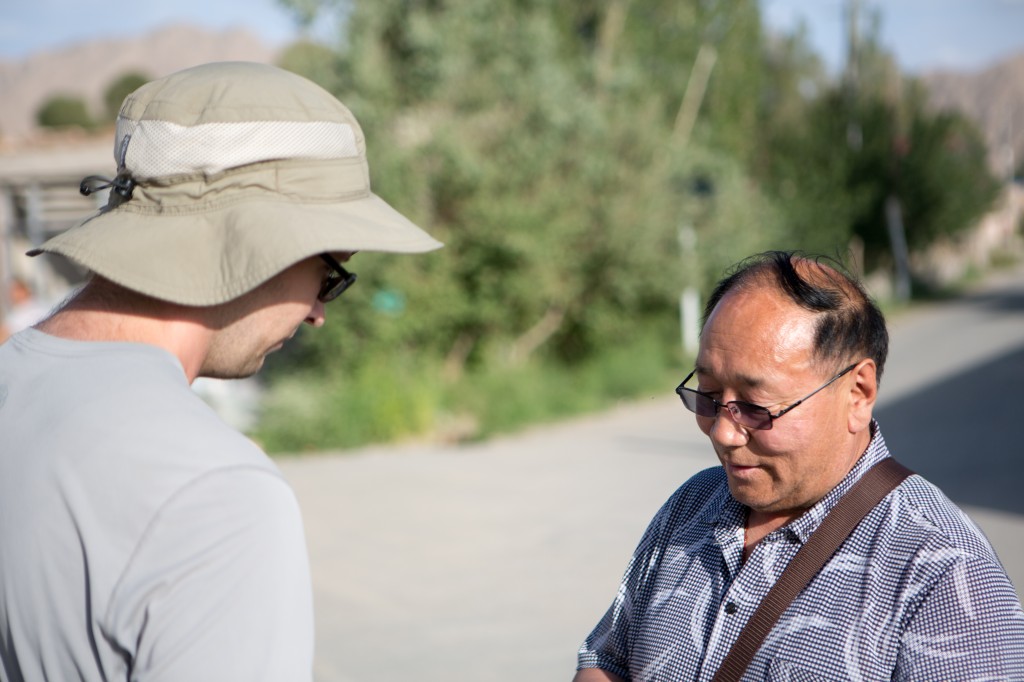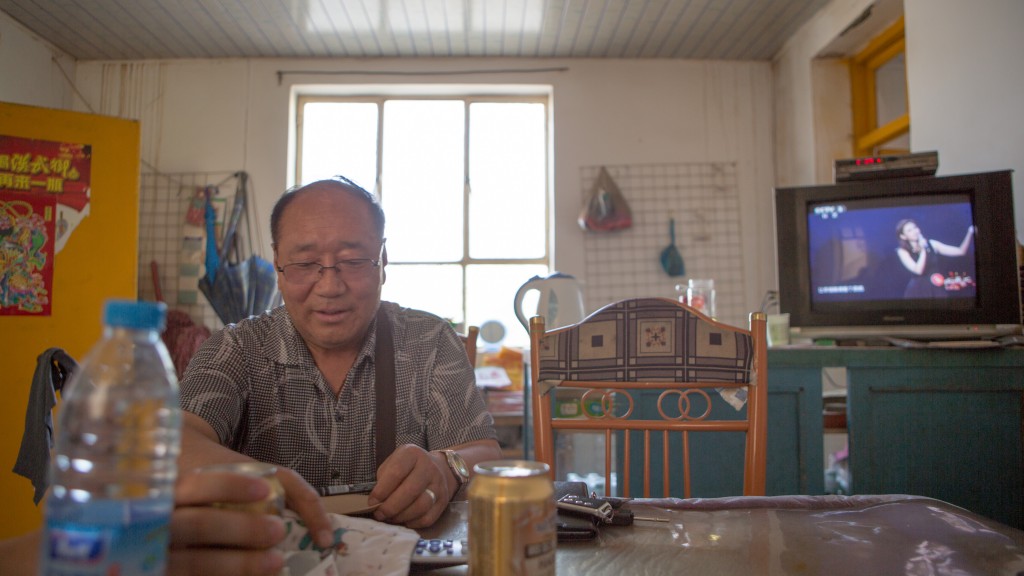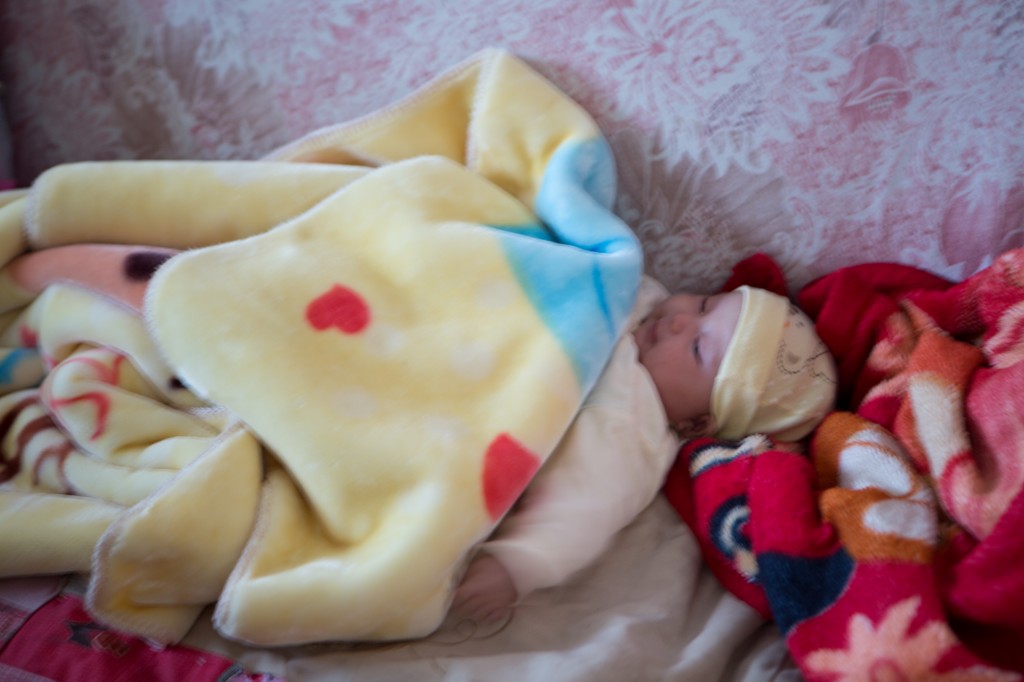We were in the tiny town of Subei, which I discussed in the previous post. During our explorations of Subei, we were walking along a country road lined just past the edge of town when a man pulled beside us on a little motorscooter. He just barely kept pace with us, wobblingly maintaining his balance at such a slow speed. I could not tell if he wanted to talk with us or if he was just drunk.
It was both.
A balding man wearing a semi-casual collared shirt, staring at us over his tinted glasses, saluted us with the typical greeting of: “Herro!”
I turned around and smiled, “Ni Hao.”
The man was a doctor in the Mongolian Medicine hospital we had passed on our walk out. The area around Subei was largely populated by Mongolians and they retained a strong influence within the town, even having their a hospital to practice their own traditional Mongolian medicine.
The man had been drinking, I assume for some official function at the hospital. We talked a little more, and he gave me his phone number, an ordeal that took several minutes because his thought process was less than fluid. After a little while, he pushed his motorbike to the side of the road and waved us into what looked like someone’s house but apparently doubled as a store.
Inside, we sat down at what may have been someone’s kitchen table. The Mongolian man ordered us each a beer, the priciest they had in this two-bit town, throwing a wad of money at the old man bringing the beers. The old man brought back his change just as a child on a couch beside us began to cry. The old man picked him up and began to assuage him.
“Is that your son?” The Mongolian asked the old man.
“No.” The old man laughed, embarrassed, almost angry. “It’s my grandson.”
The Mongolian humphed and continued chatting with us. We sat, drinking and talking for more than fifteen minutes. The man’s name was Patsu; carefully, he wrote his name out in Mongolian for us, the infant’s cries still going. Patsu was jolly. Part of it was the alcohol, but it was largely natural. He bellowed when he laughed and looked at us piercingly when I spoke to him.
He was drunk, so the conversation revolved around several points that he repeated.
“I am Mongolian. We are not like the Han Chinese. We are stronger physically, we have more endurance, and we are nicer. And we like to get drunk,” he explained, as if I needed to be enlightened on that last point. “We are a great race. Genghis Khan conquered all of Asia. We are a very simple people, it was a very simple project. It was only about conquest. Our race is great.”
“America is a great place, a powerful country. I have lived in Russia and Mongolia, and I have family there. But I would like to go to America. However, I need someone to write a letter of invitation. If perhaps we meet later, and you think I am a good person, perhaps you will consider writing one for me.” He made clear his motives in talking with us. “If you are a Mongolian citizen or a Russian citizen, it is not very difficult to get a visa to the United States. But if you are a Chinese citizen, like me, even though I am Mongolian, it is much more difficult.”
We left the store with the old man and continued walking. Patsu left his motorbike behind, waving off our protestations that he should not leave it there.
We walked on along the road, a steady trickle of motorbikes and three-wheeled carts passing by, each looking at our group wide-eyed. From telephone poles above us, the village was broadcasting a regular propaganda program, one hour in the morning, two hours in the afternoon.
Then he told us a joke about President Bush, the younger. I did not get it, though I am not sure if it was because of my language abilities or because he was drunk. Either way, I laughed politely. The propaganda program spoke about being civilized and not getting too drunk. I love propaganda; it is only good at doing bad things, but it does so little of the good it seeks to achieve.
We stopped by another store, and Patsu threw more money around. We talked more of largely the same things.
And then we parted. Patsu told us to call him later, when we returned to town. We watched him stumble back in the direction of his motorbike. We went the opposite way.
Like the others we met in Subei, Patsu desired contact with someone outside of this two-bit town. Patsu had been outside of Subei, outside of China even, and it was clear that that was part of the reason he was so wealthy. But he wanted more, he wanted to go to America. He never explained what he would have done in America. Perhaps he believed it would have made him richer. Or perhaps, he only wanted to go there out of admiration.
We will never know…


